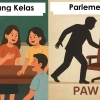Introduction
Tensions between Iran and Israel are not a new phenomenon in the geopolitical dynamics of the Middle East. Since the Iranian Revolution in 1979, relations between the two countries have been in an ideological and strategic hostility that has been intensified by Iran's nuclear program as well as their involvement in proxy war networks in Syria, Lebanon, and Palestine (Byman, 2005; Ehteshami, 2002). Israel has consistently perceived Iran's nuclear weapons potential as an existential threat, while Iran views Israel as a regional occupier that must be countered through alliances with non-state groups such as Hezbollah. These tensions entered a new phase in mid-June 2025 when Israel, through Mossad and Air Force operatives, launched attacks on a number of Iranian nuclear facilities in Natanz, Isfahan and Fordow (The Guardian, 2025). The climax came on June 21 when the United States joined the military campaign by launching Tomahawk missiles and strategic airstrikes using B-2 stealth bombers (Associated Press, 2025). Iran responded by launching hundreds of ballistic missiles and drones into Israeli territory, causing civilian casualties and damage to health facilities and infrastructure.
This ever expanding conflict not only reflects the clash of interests between two countries, but also shows a major transformation in the character of 21st century warfare: the speed of escalation, the involvement of global actors, and the use of advanced military technologies such as autonomous drones and bunker-busters. From an international relations perspective, the Iran and Israel conflict of 2025 represents a paradigm shift in modern warfare, where battles are no longer confined to conventional battlefields, but rather touch on aspects of humanitarian law, civilian protection, and digital freedom. Therefore, it is important to analyze this conflict within the framework of hybrid warfare and the dynamics of international system anarchy that complicate effective peaceful resolution.
Body
A. Military Escalation and Conflict Expansion
The Iran and Israel conflict has significantly escalated since mid June 2025 through direct military strikes against Iran's strategic infrastructure. Israeli strikes led by the Mossad and the Israeli Air Force (IAF) succeeded in destroying some of Iran's key nuclear facilities such as Natanz, Isfahan and Fordow in an offensive operation codenamed Rising Lion (The Guardian, 2025). Not only that, the United States expanded this conflict by launching Tomahawk missiles and bombing Iranian nuclear sites using B-2 stealth bombers, making this conflict not only regional but involving global actors directly (Associated Press, 2025). In terms of realism, this action reflects the state's efforts to maintain its survival in an anarchic international system, where there is no global authority that can effectively guarantee collective security (Waltz, 1979). Israel's pre-emptive strike confirms how threat calculations and strategic interests drive states to act unilaterally in order to maintain military supremacy in the region.
B. Civilian Impacts and International Humanitarian Law Challenges
The escalation of this conflict not only impacted military infrastructure, but also inflicted heavy losses in the civilian sector. Iran launched hundreds of missiles and drones at key Israeli cities such as Haifa, Tel Aviv, and Be'er Sheva, resulting in casualties, including at Soroka hospital which was directly hit (Reuters, 2025). On the other hand, reports from Iran state that more than 400 people were killed and more than 3,000 injured in just the first two weeks of the conflict, mostly non combatants (Al Jazeera, 2025). In addition, the Iranian government imposed a nationwide internet blackout of up to 97% to control the dissemination of information, raising civil liberties concerns (Wikipedia, 2025). The violation of medical facilities and disruption of public communication access raise serious questions about compliance with the principles of international humanitarian law, particularly the 1949 Geneva Conventions that prohibit attacks on civilian facilities in armed conflict (ICRC, 1949).
C. International Responses and the Failure of Multilateral Diplomacy
International reactions to the conflict reflected the tension between national interests and global peace principles. The Istanbul-based Organization of Islamic Cooperation (OIC) urged an immediate ceasefire, while the United Nations Security Council (UNSC), Russia, China and a number of European countries called for de-escalation and a cessation of violence (WSJ, 2025; Reuters, 2025). However, this diplomatic pressure failed to stop military action on the ground, partly because the United States and Israel refused to halt operations until Iran's nuclear facilities were declared "fully inactive" (The Times, 2025). The fragmented global response demonstrates the limitations of multilateral mechanisms in dealing with armed conflicts between states of high strategic importance. According to Mearsheimer (2001), in an international system that adheres to the logic of power, international institutions tend to be ineffective when dealing with the vital interests of state actors, especially if large states are directly involved.







